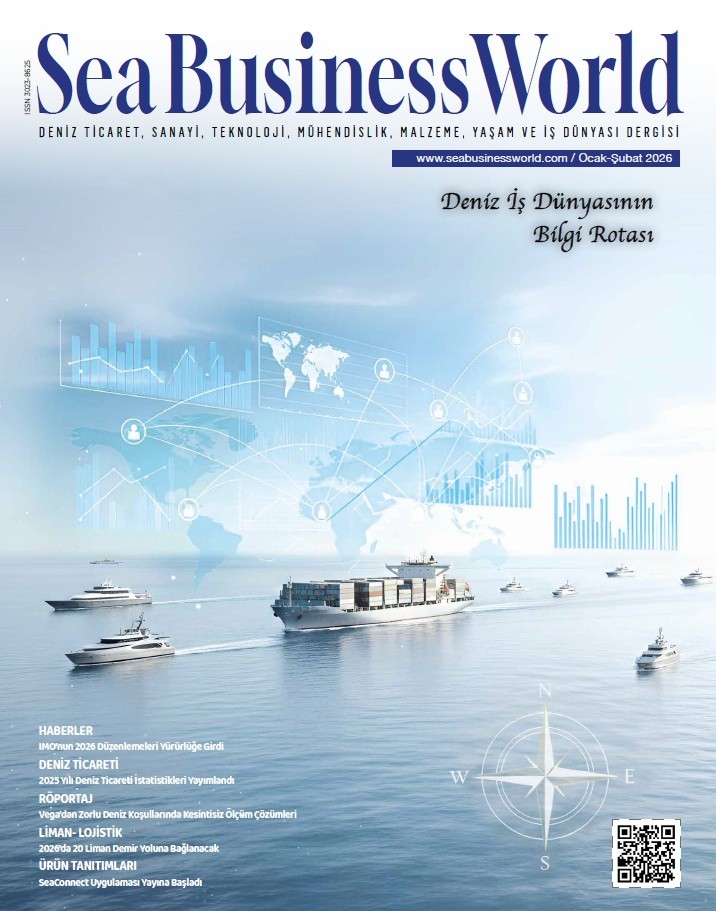Turkey is opening a new chapter in maritime and logistics, focusing on multi-axis logistics corridors, green transformation, and digitalization. The Turkish-owned merchant fleet's rise to 10th place in the world rankings, with a capacity of 52 million DWT, is supported by Arrow-to-Board and cybersecurity initiatives, port-hinterland railway lines, and digital logistics corridors. Deputy Minister of Transport and Infrastructure Durmuş Ünüvar, who outlined Turkey's maritime and logistics vision around multi-axis logistics corridors, the 2053 net zero target, Green Port implementations, fleet renewal, and alternative fuels, said, "We will continue to take steps to propel Turkish maritime into the future."
The share of maritime transport within Turkey's logistics master plan is constantly increasing. As the Ministry, how do you define the role of maritime transport in integration with Logistics Corridors and Free Zones? What Steps Are Being Taken to Make Turkey a Regional Superpower?
Turkey occupies a strategic position among international logistics corridors, ensuring the safe, uninterrupted, and efficient operation of global trade routes. Its central role, particularly in the Middle Corridor and Development Path Corridor projects, makes Turkey a key logistics bridge for transit transport between Asia, Europe, and the Middle East.
The Middle Corridor is a strategic transportation and logistics route, starting in western China, passing through Central Asian countries and crossing the Caspian Sea, extending to Turkey via Azerbaijan and Georgia, and then to Europe. Turkey's Baku-Tbilisi-Kars Railway Line, the Marmaray Tunnel, and its integration with the European railway network ensure the uninterrupted transportation of cargo from Asia to Europe. Thus, Turkey strengthens its position as a transit country and logistics hub on global trade routes.
In addition to the Baku-Tbilisi-Kars line, the Kars-Nakhchivan-Zengezur connection will constitute another important channel of the Middle Corridor west of the Caspian Sea. Cargo from Alat Port will reach our country uninterrupted via Nakhchivan. We view these two lines as complementary, not alternatives. They will act as backups, particularly in the event of maintenance or repair closures, reinforcing the Middle Corridor's uninterrupted transportation capabilities.
''The Kars-Nakhchivan line strengthens common development and solidarity by establishing an uninterrupted connection within the Turkic world.''
The Kars-Nakhchivan line will leverage the location of Nakhchivan and Azerbaijan, enabling us to establish another uninterrupted line with the Turkic world. It will strengthen not only trade but also our spirit of shared development and solidarity.
Another corridor of great strategic importance for our country is the Development Road Project, which aims to transport cargo from India, South Asia, and the Persian Gulf countries via road and rail, starting from the FAV Port, to Turkey, and from there to Europe. This project will provide uninterrupted transportation from the FAV Port to London. A Memorandum of Understanding (MoU) for cooperation with Iraq, the United Arab Emirates, and Qatar was signed during President Recep Tayyip Erdoğan's visit to Baghdad regarding the management of the project.
The completion of the line will strengthen Turkey's position as a transit country on the Persian Gulf-Turkey-Europe axis, and direct benefits will be derived from the increased trade volume with Iraq and the Gulf countries.
'The Development Road, the Zangezur Connection, and the Middle Corridor will transform Turkey into a multifaceted logistics hub, positioning it as a hub where different routes meet in both energy transportation and global trade.'
Turkey's active role in these projects presents a strategic opportunity to develop logistics infrastructure, increase its share in transit transportation, and become a strong logistics actor in global trade.
"The Turkish maritime sector is accelerating its transformation with environmentally friendly practices in line with the 2053 net zero target."
Turkey's strategic location naturally makes us a major player in the international maritime arena. As a manager involved in collaborations in this field, you have a close understanding of the process. How do you assess the international standing of Turkish maritime? Furthermore, what would you like to say about the contributions of collaborations with the EU, the IMO, and other regional organizations to our sector?
The foundation of Turkey's maritime sector is our unique geographical location, our centuries-old deep-rooted maritime heritage, and our highly dynamic maritime industry. The Turkish Straits, which connect the Black Sea, the Mediterranean, and the Aegean, naturally make our country an indispensable player in global maritime trade. This main artery connecting the Black Sea coastal states to world markets, along with the Suez Canal and the Strait of Gibraltar, places the Mediterranean at the center of global trade transit routes. Today, our Turkish-owned merchant fleet, with a carrying capacity exceeding 52 million DWT, has risen to 10th place in the world. Our Turkish flag is on the White Lists of major PSC regimes, such as the Paris and Tokyo Memorandums of Understanding, and over 140,000 highly qualified Turkish seafarers serve the global maritime industry. Last year, we successfully completed the IMSAS inspection conducted by the IMO for its member states.
Our country operates in nearly every aspect of the maritime industry. We have strong capabilities in shipbuilding, maintenance and repair, recycling, port management, logistics, ship classification, maritime insurance, and seafarer training. According to the "Boat International Global Order Book" 2025 report, Turkey has risen to second place in the world in mega yacht production. With our environmentally friendly facilities, which comply with the provisions of the IMO's Hong Kong Convention, we are among the top five countries in the world in ship recycling. The Turkish maritime sector stands out not only for its economic dimension but also for its environmental responsibilities. As part of the Paris Agreement, we set a net-zero emissions target for 2053. Within this scope, new regulations are encouraging LNG and hybrid-powered vessels, and "Green Port" practices are being expanded in our ports. Applications such as renewable energy, shore-based electricity supply, and waste management constitute a strong step towards environmentally friendly transformation.
One of the most concrete examples of our EU cooperation is the Decarbonization of Maritime and Green Maritime Project. This project, supported by the EBRD with a total financing of €70 million, encourages the use of alternative fuels (LNG, methanol, hydrogen, ammonia, etc.) and supports investments that will ensure energy efficiency in our ports. The World Bank is also contributing to the process by launching a special study on sustainable maritime transport and ports in Turkey.
Turkey also supports combined transport to increase the share of maritime transport. Thanks to the incentives granted to our Ro-Ro lines, the İzmir-Sete, Ambarlı-Trieste, Tekirdağ-Trieste, and Karasu-Constanța lines have become operational. We play an active role in international organizations. We have been a member of the IMO Council without interruption since 1999. In 2024, we were elected to the Council for the sixth time at the General Assembly of the International Organization for Maritime Aids to Navigation (IALA). Turkey also played an active role in IALA's transition to "International Organization" status. In the context of regional collaborations, we are increasing information sharing on maritime traffic services in the Black Sea and taking an active role in environmental protection activities in the Mediterranean within the framework of the Barcelona Convention. The TRACECA and Middle Corridor projects also demonstrate that Turkey is at the heart of regional logistics integration. Turkish maritime's strong international position is reinforced not only by our geographical advantages, but also by the tangible achievements we have achieved through collaborations with the EU, IMO, EMSA, IALA, the World Bank, and regional organizations. Thus, our sector continues to have a global voice in every area, from safety and the environment to competitiveness and sustainability.
The Turkish maritime sector needs to take significant steps to meet the IMO's 2030 and 2050 carbon targets. What kind of work are you carrying out as a ministry regarding green port practices, the use of alternative fuels such as LNG, methanol, and hydrogen, and energy efficiency?
As outlined in the "2053 Transport and Logistics Master Plan," published in January 2023 and intended to inform our Ministry's investments and plans for the next 30 years, we have identified low-carbon fuel use, carbon emission reduction, carbon footprint assessment, and carbon taxation as key steps to be taken, and we are continuing our efforts in this direction.
As part of the Green Port Certificate program, environmentally friendly infrastructure investments, energy efficiency-enhancing practices, and effective waste management systems are being implemented at our ports. The "Green Port Project," launched by our Ministry, aims to:
• Use natural and renewable energy resources (e.g., establish wind farms),
• Minimize carbon dioxide emissions from port activities,
• Replace fossil fuel-powered handling equipment with electrically powered equipment,
• Use LED lighting,
• Use environmentally friendly and user-friendly new-generation cargo handling equipment,
• Work in environmentally friendly, energy-saving, and people-focused buildings,
• Maximize Occupational Health and Safety at ports,
• Maintain effective and efficient port operations,
• Implement energy efficiency practices,
• Strengthen the port's image and increase its international competitiveness,
• Protect public health from the harmful effects of port operations.
In addition to LNG, research and development projects for the use of alternative fuels such as methanol and hydrogen are being supported, and our shipyards are being strengthened in this regard. To improve the energy performance of our existing ship fleet, compliance with EEXI and CII regulations is being meticulously monitored. Furthermore, we aim to reduce emissions through digital monitoring systems and operational improvements. Strong collaborations are being established with universities, industry stakeholders, and international organizations during the preparation of the national carbon reduction strategy, aiming to ensure that our maritime sector complies with both IMO targets and the European Green Deal.
Furthermore, a project submitted to the EU Commission within the framework of the IPA III program aims to establish a financial support mechanism for environmentally friendly and innovative technologies on our ships and in our ports. The project aims to:
• Construction of new low-emission ships
• Conversion of existing conventionally fueled ships
• In port facilities and marinas; Installation of environmentally friendly infrastructure such as port electricity, sustainable energy use, and solar panels.
• Establishment of fuel stations for LNG, Bio-LNG, Methanol, Green Hydrogen, and Ammonia.
Our Ministry and the European Bank for Reconstruction and Development (EBRD) have jointly launched the "Legislative Structure, Market Mechanisms, and Institutional Capacity Development Project for the Decarbonization of the Maritime Sector in Türkiye." The project aims to assess the potential use of alternative fuels to reduce greenhouse gas emissions from maritime transport in Turkey, develop solutions to reduce compliance costs, and establish a country-specific monitoring, reporting, and verification (MRV) system. It also includes feasibility studies for green maritime transport corridors.
''The main objective of all efforts is to transform the Turkish Straits not only as a safe corridor for international trade but also as a maritime model that prioritizes environmental sustainability.''
The Turkish Straits are a strategic chokepoint for global trade. Increasing tanker and cargo ship traffic also raises safety issues. What new regulations and technological solutions are you working on to ensure the safe, expeditious, and environmentally friendly management of shipping traffic through the Straits?
Due to their geostrategic location, the Turkish Straits are a critical artery and energy transit corridor not only for Turkey but also for global maritime transport, particularly for countries bordering the Black Sea. This characteristic also brings with it a busy and active shipping traffic.
In 2024, the Bosphorus witnessed a total of 41,363 ship movements, transporting 447.57 million tons of cargo. 40.7% of this was hazardous cargo, with tankers carrying crude oil and its derivatives accounting for a significant portion of the total traffic. In the same year, the Dardanelles saw 45,849 ship movements, carrying 591.86 million tons of cargo, 35% of which was hazardous cargo. These figures, considering the increasing number of ship passages and the increasing size of vessels, highlight the importance of managing traffic safely and with environmental considerations.
The Turkish Straits Maritime Traffic Regulations are constantly revised by the Ministry of Transport and Infrastructure, and passage procedures for vessels carrying hazardous cargo are prioritized with navigational safety and environmental safety. Furthermore, measures are being implemented to reduce waiting times for vessels. The software and hardware for the Turkish Straits Vessel Traffic Services have been developed domestically and nationally through the collaboration of Aselsan and Havelsan. Furthermore, sensor-equipped buoys and lights to be positioned in the Bosphorus will monitor current and wave conditions, ensuring dynamic management of vessel traffic.
In pilotage services, a key component of navigational safety, the rate of guided passage in the Bosphorus increased from 41% in 2004 to 61.2% in 2024, and in Çanakkale from 29% to 51.7%. New pilotage stations have been commissioned in this context. In line with the renewal of the General Directorate of Coastal Safety's fleet, emergency response tugboats, rhibs, and pilot boats have been added to the fleet in recent years, and emergency response capacity will be significantly increased with new vessels to be delivered by 2026. The aim of all these efforts is to transform the Turkish Straits not only into a safe corridor for international trade but also a maritime model that prioritizes environmental sustainability.
Turkey holds a critical position in energy imports and exports. What are the Ministry's priorities regarding energy terminals, LNG facilities, and strategic port investments? How do these projects relate to energy security?
Turkey's strategic importance in energy imports and exports necessitates the safe and efficient operation of its energy infrastructure. Our Ministry prioritizes safety, environmental sustainability, and efficiency in energy terminals, LNG facilities, energy ships, and strategic port projects. To this end, comprehensive studies are underway to increase the capacity, modernize, and ensure the safe operation of existing and new facilities. Energy ships in Turkey play a critical role in the transportation of LNG and other fuels, contributing to strengthening energy supply security and reducing external dependency.
The infrastructure and technology investments recently made by our Ministry of Energy and Natural Resources to improve energy transmission and storage infrastructure, and to explore new energy resources within our sovereign territory and make them available to the public are vital for our efforts towards energy independence. In this context, I believe it is important to highlight the addition of drilling vessels, seismic research vessels, and FSRU vessels to our national fleet. As part of strategic decisions, FSRU vessels deployed to key locations such as Dörtyol, Aliağa, and Saros help us develop alternative solutions for LNG supply. Necessary coordination is provided for the implementation of coastal structures planned by both the private sector and the Ministry of Energy, and potential coastal structure investments in areas close to energy facilities are evaluated based on the presence of energy facilities. Infrastructure capable of energy transfer/storage is also being planned for projects undertaken by our Ministry. In our own projects, we prioritize the sustainability and security of energy facilities, even downsizing if necessary. If necessary, we can revise the design of our projects to accommodate energy infrastructure. We do this not only for our energy infrastructure but also for our defense infrastructure, as needed. Filyos Port is a prime example of this. As everyone knows, the port we planned and constructed as the largest port in the Black Sea has become an LNG hub in line with the needs of the Ministry of Energy. Similarly, we have planned the İyidere Port, which we are currently under construction, to accommodate the TCG Anadolu when necessary.
"We are implementing comprehensive support mechanisms to reduce the average age of the Turkish merchant fleet and increase its competitiveness."
Average fleet age and competitiveness are important factors affecting Turkish shipowners in the international market. What types of support mechanisms are being developed to renew the Turkish merchant fleet and strengthen its international competitiveness?
As of July 2025, the Turkish-owned merchant marine fleet of 1,000 GT and above, with a carrying capacity exceeding 52 million DWT, rose one place to 10th in the global fleet rankings. We are implementing comprehensive support mechanisms to reduce the average age of the Turkish merchant marine fleet, which stands at 22.1, and to enhance its competitiveness. In this way, we aim to strengthen the position of our shipowners in the international market.
We encourage fleet renewal projects with financing and credit facilities. The modern shipbuilding capabilities of our domestic shipyards provide a significant advantage in this process.
In this context, we have implemented a significant incentive mechanism for newly built ships through our Ministry with our Scrap Ship Incentive. We aim to support the scrapping of ships that have reached the end of their economic and technical lifespan and provide incentives for the replacement of older ships in our fleet with environmentally friendly and technologically superior vessels. To date, we have provided $15.5 million in support to our sector.
''As the Ministry, we are comprehensively examining the adaptability of the Ok-to-Board application to the maritime sector.''
The implementation of the Ok-to-Board application in the maritime sector is also on the agenda. This system is expected to provide significant advantages, particularly in terms of ship crew entry and exit procedures at ports, visa processes, and digital security checks in maritime transportation. What kind of studies are you carrying out as the Ministry regarding the applicability of Ok-to-Board in the maritime sector? What contributions are expected to the sector with the implementation of this system?
The Ok-to-Board application will significantly simplify the sector by expediting port entry and exit permits and crew procedures. As the Ministry, we are comprehensively examining the adaptability of this application to the maritime sector.
We are working in coordination with port operators, border gates, and relevant institutions. In this context, we aim to integrate digital security checks and visa processes in line with international standards. Last year, we personally discussed this issue with the IMO Secretary General and conveyed that the IMO should take a more active role in facilitating the issuance of visas for seafarers.
"We are developing solutions compliant with international standards to make our ports and ships more resilient to cyber threats."
New technologies are rapidly gaining ground in the sector, from autonomous ships to blockchain-based logistics. What steps are being taken to accelerate the Turkish maritime sector's adoption of these technologies? Is there a specific strategy for cybersecurity?
Maritime, with 41% of the support we provided to R&D projects last year, was provided by the Ministry. With the legal amendment we made in July 2024, R&D support, previously provided only to communications projects by our Ministry's UDHAM presidency, will now be extended to projects in all areas of maritime.
New technologies are being rapidly adopted in the maritime sector, and many applications, from autonomous ships to blockchain-based logistics solutions, are gaining prominence. Our Ministry is conducting technical reviews and strategic planning with stakeholders to accelerate the Turkish maritime sector's adoption of these technologies. In this context, we aim to increase the digitalization capacity of ship operators and port managements. Furthermore, developing specific strategies against cybersecurity risks and strengthening infrastructure are among our priority activities. This ensures that the Turkish maritime sector is aligned with international standards and technologically competitive.
Regarding cybersecurity, we are implementing a multifaceted strategy. At the MSC 110 meeting, Turkey presented a paper proposing that cybersecurity training be provided as a separate model course. In this context, we have prepared a draft cybersecurity model course in collaboration with Istanbul Technical University. We are also actively participating in the development of a non-mandatory "Cybersecurity Code."
Furthermore, we are developing solutions aligned with international standards to make our ports and ships more resilient to cyber threats. This not only prepares our maritime sector for the future but also ensures a more reliable position on a global scale.
Türkiye's strategic location makes our country a natural logistics hub. Could you share the ministry's anticipated steps for the coming period, including strengthening hinterland connections, modernizing port infrastructures, digitalization projects, and integrating intermodal transportation to fully realize this potential?
To fully utilize the potential afforded by our strategic location, we are conducting planning and evaluation studies in the areas of strengthening hinterland connections, modernizing port infrastructures, digitalization projects, and integrating intermodal transportation.
In this context, increasing port capacity, improving operational efficiency, and developing digital infrastructures are among our priority goals. Furthermore, we aim to create seamless logistics chains by integrating rail, road, and maritime transportation. We are making our plans by allocating more than fifty percent of our ministry's budget to railway investments. We plan to support the increase in port capacity by strengthening our connection to the railway network through the construction of fishbone lines at our ports, while also expanding multimodal transportation and reducing costs. In the coming period, we plan to increase integration with "Digital Logistics Corridors" and "Green Transportation Projects." Thus, Turkey will strengthen its role as a logistics hub, not only with its geographical but also technological advantages.
As we all know, while we are designing the future today, our "2053 Transport and Logistics Master Plan," which outlines our Ministry's vision to provide our country with a science-based, environmentally friendly, sustainable, and historically sensitive transportation infrastructure focused on logistics, mobility, and digitalization, has been completed and published. This Master Plan, which will shed light on our future work in areas such as developing multimodal transportation and strengthening our railway and port infrastructure, serves as the foundation of our transportation planning. We are carrying out our investments and planning within this framework.
"Green transformation, digitalization, and human resource development will be among our priorities."
Do you have any final additions?
Strong maritime governance is possible with a strong maritime sector and navy. Turkey is among the few countries in the world that can design and build ships, operate them to world standards, operate ports in many countries, and recycle end-of-life vessels in accordance with international agreements and standards. With its awareness of the blue economy and strategic importance of fisheries, marine tourism, and the sea, it also has the capacity to elevate its knowledge and human resources to much higher levels.
In the coming period, green transformation, digitalization, and human resource development will be among our priorities. These steps will shape the future not only of our country but also of the region. Turkey has a very strong potential in maritime and logistics. To fully utilize this potential, we are continuing our work in collaboration with the public, private sectors, and academia. With this vision, we will continue to take steps that will carry Turkish maritime industry into the future.





